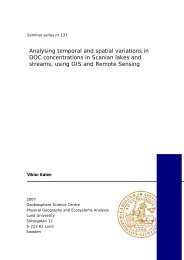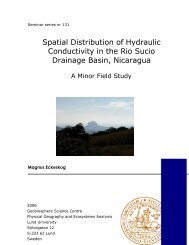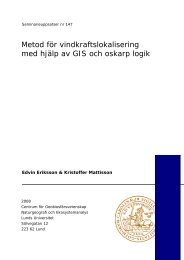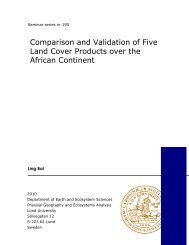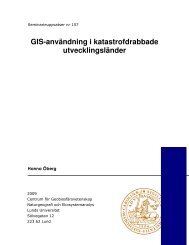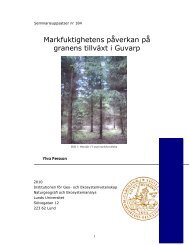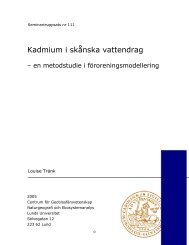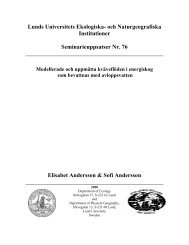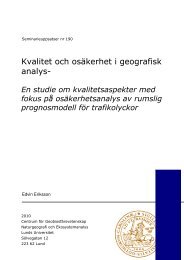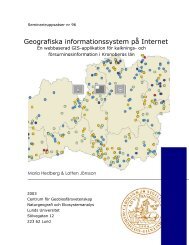Finding Potential Sites for Small-Scale Hydro Power in Uganda: a ...
Finding Potential Sites for Small-Scale Hydro Power in Uganda: a ...
Finding Potential Sites for Small-Scale Hydro Power in Uganda: a ...
Create successful ePaper yourself
Turn your PDF publications into a flip-book with our unique Google optimized e-Paper software.
As described <strong>in</strong> chapter 3.3.3 all referenced authors conclude that energy and electricityplays an important role <strong>in</strong> economic growth and rural development. As Porcaro andTakada (2005) writes, the most evident impacts of modern energy services are that theystimulate <strong>in</strong>come generat<strong>in</strong>g bus<strong>in</strong>esses at local level, improve education, gender equalityand health. Even though Holland et al. (2001) argues that electricity will not <strong>in</strong>itiatedevelopment, it can stimulate development that is already tak<strong>in</strong>g place. In order <strong>for</strong>development to take place through access to electricity, we believe that some k<strong>in</strong>d ofbasic economic condition as well as knowledge about the field of application is anecessity. The electricity would be of no use <strong>in</strong> a village where there are; no means to buyapplications such as light bulbs or refrigerators or no knowledge of <strong>for</strong> example toolupgrad<strong>in</strong>g (electrical trimmers, lathes etc.), which will <strong>in</strong>crease productivity.When <strong>in</strong>terview<strong>in</strong>g the Rural Electrification Agency we found that the RuralElectrification Strategy and Plan does not conta<strong>in</strong> any plans or projects to assist ruralelectrification through implementation of small-scale hydropower stations. Instead theirma<strong>in</strong> approach is to extent the exist<strong>in</strong>g grid, but also m<strong>in</strong>i-grids and photovoltaic units.We consider the grid extension to be a good strategy although it might take a long timeto electrify all of <strong>Uganda</strong>, s<strong>in</strong>ce it seems to be a rather time-consum<strong>in</strong>g process and alsodifficult and expensive to reach remote areas. In order <strong>for</strong> the development to progress,we there<strong>for</strong>e believe that the REA should use small-scale hydropower as a complement,both dur<strong>in</strong>g and after the grid extension, s<strong>in</strong>ce it is efficient, reliable, relatively cheap andenvironmentally friendly.The per<strong>for</strong>med <strong>in</strong>terviews identify an exist<strong>in</strong>g need <strong>for</strong> electricity among the ruralpopulation <strong>in</strong> <strong>Uganda</strong>. This need is a foundation <strong>for</strong> projects such as small-scalehydropower to be successfully implemented. Even though the people concerned havesome means to pay <strong>for</strong> the projects, another prerequisite that must be fulfilled is that aproper f<strong>in</strong>anc<strong>in</strong>g system is available. This could be arranged through either governmentalsupport, such as the grants from the Rural Electricity Fund, subsidies from aidorganizations or private <strong>in</strong>vestors and micro credits.64



